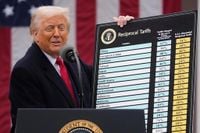As the tensions between the United States and China continue to escalate, the impact of President Donald Trump's tariffs is becoming increasingly apparent in both domestic and global markets. On April 28, 2025, the S&P 500 index fell by 0.3%, reflecting a broader market retreat influenced by a decline in shares of major technology companies ahead of their earnings reports. The Nasdaq Composite dropped 0.6%, while the Dow Jones Industrial Average remained relatively steady, trading around the flatline.
The decline in the S&P 500 was largely attributed to a pullback in stocks of some of the "Magnificent Seven" tech companies, including Amazon, Microsoft, Nvidia, Alphabet, and Tesla, all of which are expected to report their earnings soon. Despite a somewhat strong earnings season thus far, with 73% of companies beating analysts' estimates according to FactSet, Wall Street is bracing for a downturn as uncertainty surrounding trade negotiations looms large.
Treasury Secretary Scott Bessent commented on the lack of clarity regarding a potential trade agreement with China, stating that the responsibility to de-escalate tensions lies with China. He emphasized that China sells five times more to the U.S. than the U.S. sells to China, making the current tariff rates of 120% and 145% unsustainable. Bessent's remarks come in the wake of Trump's assertion that discussions with China were ongoing, despite Beijing's denials of any trade talks.
Recent days have seen some signs of easing in U.S.-China trade tensions, with both countries reportedly looking to reduce the unsustainable tariff rates that were implemented earlier this month. Barclays economist Jonathan Millar noted that while there is some optimism regarding de-escalation, it is still too early to predict a positive outcome from the negotiations.
In the wake of Trump's tariff policies, the S&P 500 has experienced significant volatility, with the index down more than 2% in April and over 10% below its 52-week high reached in February. The S&P 500 briefly entered a bear market on April 7 but has since made a recovery, albeit struggling to break through key resistance levels. Meanwhile, the Dow is on track to lose almost 5% for the month.
As the month draws to a close, investors are looking ahead to several key economic data releases, including the nonfarm payrolls report and the personal consumption expenditures price index, both of which could provide further insight into the health of the U.S. economy. The nonfarm payrolls report is set to be released on Friday, and the first-quarter gross domestic product data, along with the Federal Reserve's preferred inflation gauge, will be published on Wednesday.
In addition to the immediate impacts of tariffs on stock prices, many companies are flagging increased uncertainty in their earnings forecasts due to the trade policies. For instance, some companies have already cut or withdrawn their annual forecasts, signaling a cautious outlook as they navigate the complexities of the current trade landscape.
Meanwhile, the broader implications of Trump's tariffs are being felt across various sectors, with experts warning of potential supply shortages and layoffs in industries such as trucking, logistics, and retail. Retail giants like Walmart and Target have already expressed concerns about empty shelves and rising prices as they prepare to restock by mid-May 2025.
Echoing these sentiments, Apollo Global Management has predicted a deep recession in the U.S. as a direct result of the tariffs, warning of significant job losses in the trucking and retail sectors as economic uncertainty grows. Furthermore, a recent poll conducted by the Associated Press-NORC Center for Public Affairs Research revealed that nearly half of U.S. adults believe Trump's trade policies will lead to substantial price increases.
As the situation evolves, many small businesses are also feeling the pinch. Steve Egan, a promotional product distributor in Tampa, Florida, shared his experience of how the tariffs have impacted his business operations. Egan noted that the cost of rubber ducks he ordered from a Chinese vendor surged from 29 to 45 cents each overnight due to the tariffs, leading to a significant drop in his sales.
Despite the challenges, some analysts remain hopeful that trade deals could soon materialize. President Trump indicated in a recent interview with Time magazine that he expects several trade agreements to be finalized within the next three to four weeks. However, the lack of concrete details regarding these potential deals leaves many investors skeptical.
In the meantime, the market continues to react to any news regarding tariffs, with stocks experiencing upward momentum when hints of de-escalation are announced. The recent fluctuations in the stock market highlight the precarious balance investors must navigate in the face of ongoing trade tensions.
As the U.S. prepares for a week filled with crucial economic data and corporate earnings reports, all eyes will be on how these trade negotiations unfold and what they mean for the broader economy. With the stakes higher than ever, the outcome of these discussions could have lasting implications for businesses and consumers alike.




